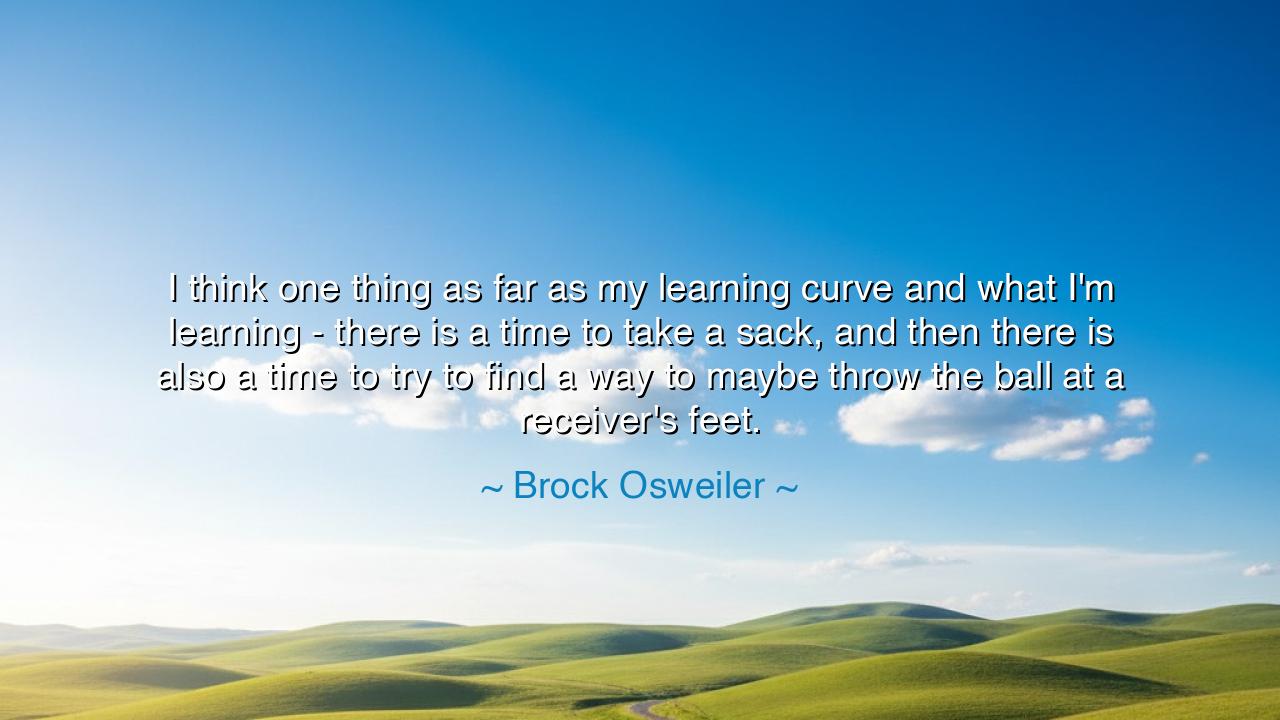
I think one thing as far as my learning curve and what I'm
I think one thing as far as my learning curve and what I'm learning - there is a time to take a sack, and then there is also a time to try to find a way to maybe throw the ball at a receiver's feet.






When Brock Osweiler said, “I think one thing as far as my learning curve and what I’m learning — there is a time to take a sack, and then there is also a time to try to find a way to maybe throw the ball at a receiver’s feet,” he was not merely speaking of football. Beneath those words lies a timeless lesson about judgment, humility, and the art of knowing when to endure and when to let go. His reflection captures a truth known to warriors, philosophers, and leaders alike: that in the battle of life, wisdom often lies not in constant victory, but in the ability to discern which losses are worth taking and which must be avoided.
In the game of football, to “take a sack” means to accept being tackled rather than forcing a risky play — to protect the ball even at the cost of losing ground. Yet to “throw the ball away” is to surrender the immediate moment to preserve the greater cause. Both require courage, but of different kinds. One is the courage to endure; the other, the courage to release. Osweiler, as a quarterback, was speaking of this delicate balance — but in truth, his words echo the eternal dance between action and restraint, between holding on and letting go. The ancients would have recognized in his thought the wisdom of the stoics, who taught that mastery begins when one learns to control impulse rather than be controlled by it.
The origin of this insight comes not from ease, but from experience. Osweiler’s career in the NFL was a story of both triumph and trial — moments of brilliance and seasons of struggle. Through it all, he learned what every craftsman of life must learn: that not every situation demands aggression, not every battle must be won by force. Sometimes, to protect the team — or one’s spirit — one must accept a setback today to safeguard the chance for victory tomorrow. His words were not the boast of an athlete but the reflection of a man who had learned the cost of pride and the wisdom of patience.
This same principle runs through the lives of history’s greatest minds. Consider the story of Marcus Aurelius, the Roman emperor and philosopher. Though he commanded vast armies and ruled an empire, he often wrote in his journals that the greatest victory is mastery over the self. He knew, as Osweiler learned on the field, that not every strike is worth making, not every charge worth leading. There are moments when to “take the sack” — to endure insult, delay, or defeat — is the higher virtue, for it prevents greater loss. And there are moments when to “throw the ball away” — to release what cannot be saved — is the act of true wisdom, for it clears the field for another day’s effort.
This truth is not confined to emperors and athletes; it lives in the heart of every person who has faced adversity. There are times in life when one must bear the weight of failure, accept the hit, and stand again. There are other times when one must abandon pride and let go of what no longer serves the greater purpose — whether that be a plan, a relationship, or a dream that has run its course. Knowing which moment is which is the essence of maturity, for the wise soul neither clings blindly nor surrenders too soon.
Osweiler’s reflection, though humble in tone, reveals the discipline of awareness — the understanding that strength is not reckless. The greatest quarterbacks, like the greatest leaders, see the field not only for what it is, but for what it may become. They know that wisdom lies in reading the storm before it strikes. So too must we learn to read the game of life — to recognize when the safest path is to take the hit with dignity, and when the noblest act is to cast away the burden and live to fight again.
The lesson in his words, then, is this: there is wisdom in timing, and timing is the breath of mastery. Do not fear the moments when you must take a step back, for retreat is sometimes the road to strength. Do not cling to the play that is doomed, for stubbornness often destroys what patience might have saved. Act when the moment demands, yield when the tide overwhelms, and always guard the integrity of your purpose.
So, my children, remember what Osweiler teaches through the language of the gridiron: that in life, as in sport, every play is a test of discernment. Learn to balance courage with prudence, ambition with restraint. For the hero is not the one who never falls — he is the one who knows when to stand firm and when to release, when to endure and when to let go. And in this balance lies the truest form of victory — the victory of wisdom over impulse, and of spirit over circumstance.






AAdministratorAdministrator
Welcome, honored guests. Please leave a comment, we will respond soon